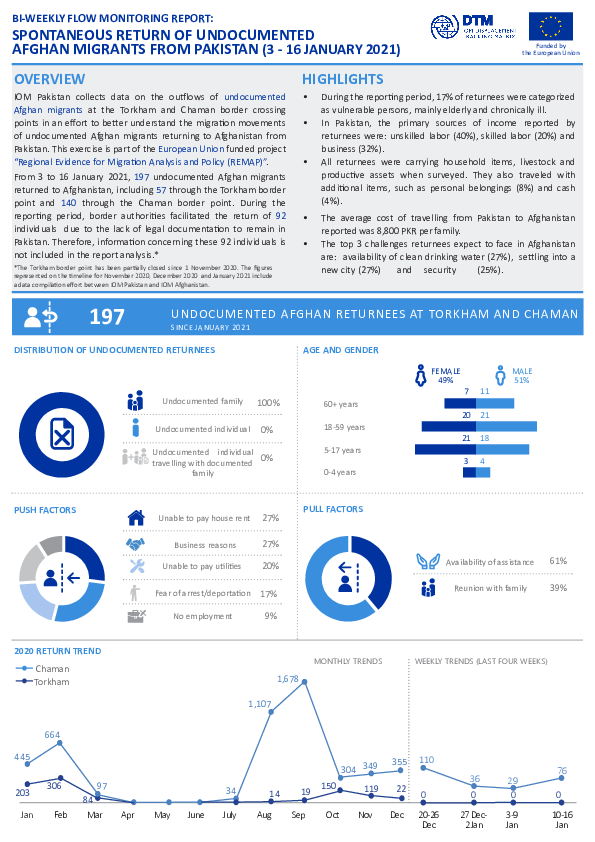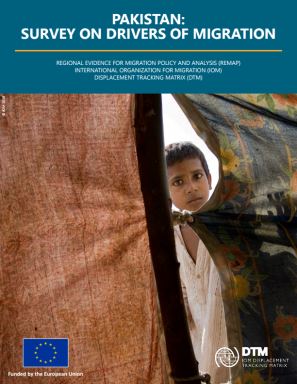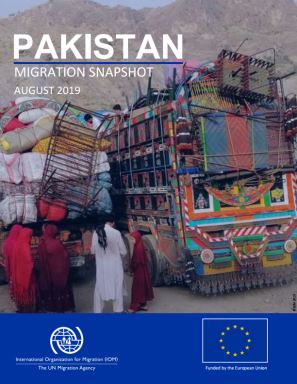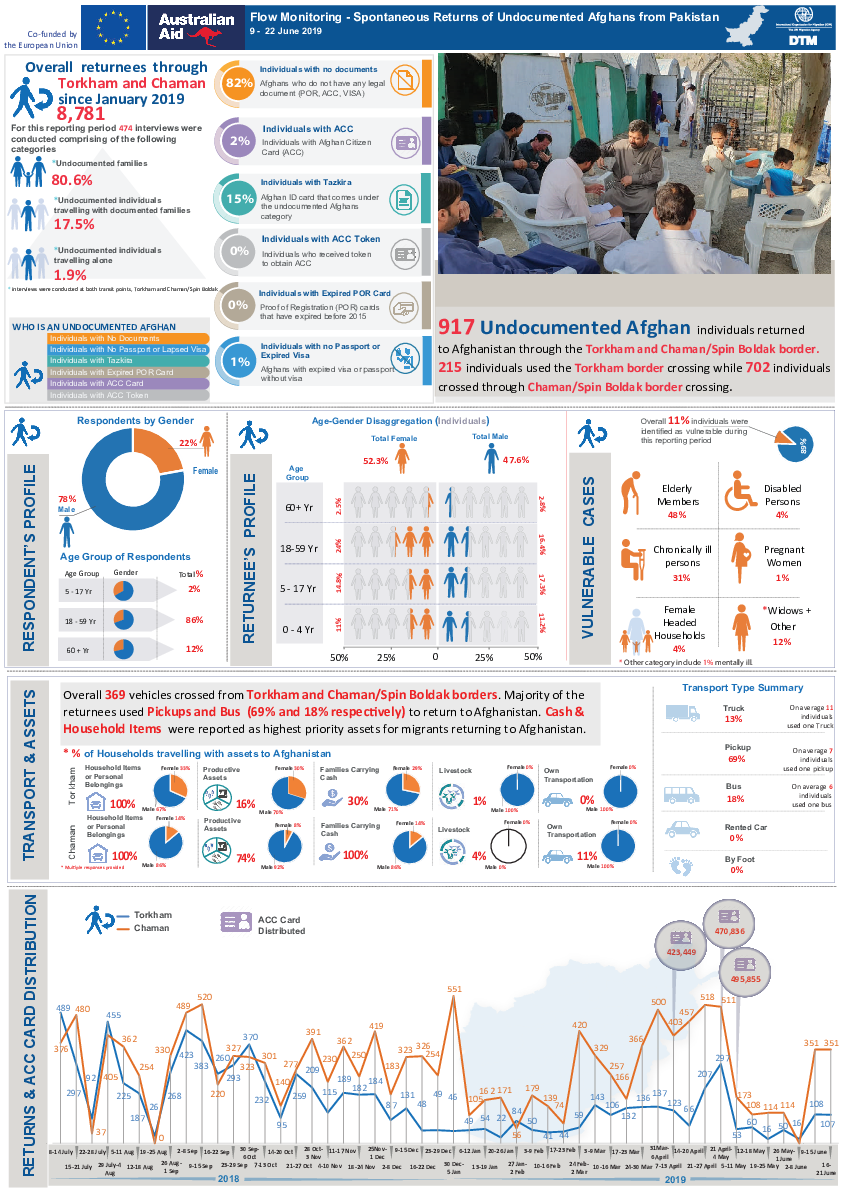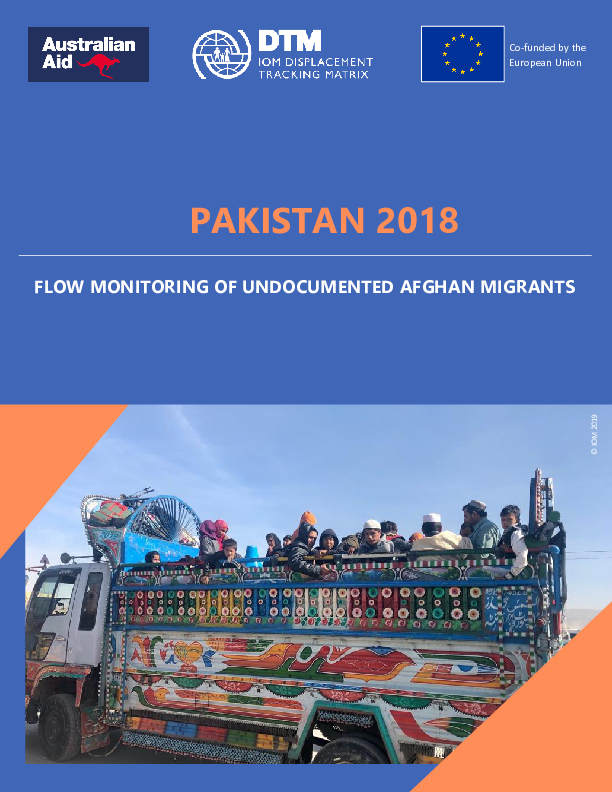-
Countries
-
Data and Analysis
-
Special Focus
-
Crisis Responses
Pakistan
Pakistan
TDPs tracked
Movimientos de desplazamiento
23,000
IDMC 2023
Ronda de recopilación de datos
Sobre Pakistan
In 2010, IOM’s Displacement Tracking Matrix (DTM) programme started its activities in Pakistan as part of IOM’s emergency flood response programme. Over the years, DTM has evolved into a comprehensive programme covering a wide range of activities. The DTM programme works closely together with a wide array of stakeholders, including government ministries and national and sub-national statistical organizations, UN agencies, and specialized research institutes. Its activities are instrumental in providing stakeholders with an evidence-base to effectively address humanitarian, transition, and development needs within the country.
In 2017, DTM started the implementation of its Flow Monitoring (FM) activities. DTM collects FM data at the Torkham (Khyber Pakthunkhwa), Chaman, Badini and Bahramcha (Balochistan) border crossing points (BCPs) to identify cross-mobility patterns and profiles of Afghans who are returning from Pakistan to Afghanistan. The data presented in FM information products is harmonized with those from the United Nations High Commissioner for Refugees (UNHCR), who also cover Ghulam Khan (Khyber Pakhtunkhwa). DTM Pakistan also actively coordinates its data collection efforts with the DTM programme in Afghanistan.
As part of the 2022 flood response, DTM launched mobility tracking operations in flood-affected settlements or settlements that hosted temporary displaced persons (TDPs) across 11 districts in Balochistan and Sindh to provide partners with timely information on the displacement situation. Since then, DTM’s mobility tracking has expanded to cover 30 districts across three provinces (Balochistan, Sindh and Khyber Pakhtunkhwa) and collects information on the multisectoral needs and recovery needs at the settlement level, in addition to the displacement situation.
In May 2023, DTM scaled-up its mobility tracking efforts to support the ongoing response efforts for Afghans in Pakistan. DTM’s Afghan response has been implemented in 33 districts across Balochistan, Khyber Pakhtunkhwa, Islamabad, Punjab, and Sindh, and aims to provide stakeholders with up-to-date information on the multisectoral needs of Afghans in the country.
Furthermore, under the European funded project “Displacement Tracking Matrix Regional Evidence for Migration Analysis and Policy (DTM REMAP), from 2019 to 2022, DTM implemented two household surveys. The first survey was the survey on Drivers of Migration (SDM) which aimed at better understanding the drivers of Pakistani international out-migration. The second survey was the “Returnee Longitudinal Survey (RLS)”. The purpose of RLS was to improve understanding of return migrants’ profiles, vulnerabilities and needs, as well as sustainable return and reintegration outcomes in the short- and medium-term.
Contacto
DTM Pakistan
DTMPakistan@iom.int
Current Donors
- EU-INTPA
- ECHO
- Ministry of Foreign Affairs of Italy
- PRM
- Canada – IRCC
- Canada (DFATD)
- Netherlands
Para obtener resultados de búsqueda más avanzados, vaya a la Página de búsqueda avanzada de informes
Pakistan — Flow Monitoring Result 2018: Summary of the key findings on characteristics of migrants from Pakistan interviewed in Europe in 2018
The surveys with migrants en route are part of the IOM’s Displacement Tracking Matrix (DTM) data collection activities in West and Central Africa, East and Horn of Africa, Libya and Europe (Albania, Bulgaria, Bosnia and Herzegovina, Greece, Hungary, Italy, North Macedonia, Montenegro,Romani
Pakistan — Flow Monitoring Of Undocumented Afghan Returnees From Pakistan (17 - 30 January 2021)
IOM Pakistan collects data on the outflows of undocumented Afghan migrants at the Torkham and Chaman border crossing points in an effort to better understand the migration movements of undocumented Afghan migrants returning to Afghanistan from Pakistan.
Point of Entry (PoE) — COVID-19 – Dashboard Pakistan (March – December 2020)
The outbreak of the COVID-19 pandemic at the beginning of the year has affected global and regional mobility, including mobility in Pakistan, through various travel disruptions and restrictions.
Pakistan — COVID-19 Point Of Entry (PoE) Analysis (March – December 2020)
The outbreak of the COVID-19 pandemic at the beginning of the year has affected global and regional mobility, including mobility in Pakistan, through various travel disruptions and restrictions.
Pakistan — Flow Monitoring of Undocumented Afghan Returnees from Pakistan (3 - 16 January 2021)
IOM Pakistan collects data on the ou lows of undocumented Afghan migrants at the Torkham and Chaman border crossing points in an effort to be er understand the migration movements of undocumented Afghan migrants returning to Afghanistan from Pakistan.
Pakistan — Flow Monitoring of Undocumented Afghan Returnees from Pakistan (20 Dec 2020 - 2 Jan 2021)
IOM Pakistan collects data on the outflows of undocumented Afghan migrants at the Torkham and Chaman border crossing points in an effort to better understand the migration movements of undocumented Afghan migrants returning to Afghanistan from Pakistan.
Pakistan — Flow Monitoring of Undocumented Afghan Returnees from Pakistan (6 - 19 Dec 2020)
IOM Pakistan collects data on the outflows of undocumented Afghan migrants at the Torkham and Chaman border crossing points in an effort to better understand the migration movements of undocumented Afghan migrants returning to Afghanistan from Pakistan.
Pakistan — Flow Monitoring of Undocumented Afghan Returnees from Pakistan (22 Nov - 5 Dec 2020)
IOM Pakistan collects data on the outflows of undocumented Afghan migrants returnees at the border crossing points in an effort to better understand the migration movements of undocumented Afghan migrants returning to Afghanistan from Pakistan.
Pakistan — Flow Monitoring of Undocumented Afghan Returnees from Pakistan (8 - 21 Nov 2020)
IOM Pakistan collects data on the outflow of undocumented Afghan migrants returnees at the Torkham and Chaman borders in an effort to be er understand migration movements of undocumented Afghan migrants who are returning to Afghanistan from Pakistan.
Pakistan — Flow Monitoring of Undocumented Afghan Returnees from Pakistan (27 Oct - 7 Nov 2020)
IOM Pakistan collects data on the outflow of undocumented Afghan migrants returnees at the Torkham and Chaman borders in an effort to be er understand migration movements of undocumented Afghan migrants who are returning to Afghanistan from Pakistan.
Pakistan – COVID-19 Point of Entry (PoE) Analysis (March – October 2020)
The outbreak of the COVID-19 pandemic at the beginning of the year has affected global and regional mobility, including mobility in Pakistan, through various travel disruptions and restrictions.
Pakistan – CMFS: Profile Of Afghan Potential Migrants in Pakistan 2016
This report is based on data collected through DTM’s Comprehensive Migration Flow Survey (CMFS) is based on the collection of primary data, which provides information on migration flows towards Europe from Afghanistan whilst focusing on eight thematic areas: (1) migrant profiles, (2) mi
Pakistan – Map: Areas of Origin and Intended Destination of Undocumented Afghan Returnees (2019)
This map provides information on the districts of origin in Pakistan and the intended provinces of destination in Afghanistan during the period between January 1 and 31 December 2019.
Pakistan – Flow Monitoring of Undocumented Afghan Migrants 2019
Since 2017, DTM Pakistan has collected data on return movements of undocumented Afghan returnees from Pakistan at two official border points (Torkham and Chaman/Spin Boldak). At these locations, information on the numbers, socio-economic profiles and vulnerabilities of und
Pakistan – Flow Monitoring of Undocumented Afghan Migrants: Comparison Report 2018/2019
Since 2017, DTM Pakistan has collected data on return movements of undocumented Afghan returnees from Pakistan at two official border points (Torkham and Chaman/Spin Boldak) between the two countries.
Pakistan – Survey on Drivers of Migration (REMAP 2019)
The key finding of this report is that motivations for Pakistani emigration revolve primarily around seeking better livelihood and income opportunities. This is reinforced by the historical relevance of labour migration out of Pakistan as well as previous data collection and analyses by IOM DTM.
Pakistan — Spontaneous Returns of Undocumented Afghans from Pakistan (29 March - 11 April 2020)
Overall there have been 1,926 returnees passing through Torkham and Chaman since January 2020. Over the past weeks, 0 Undocumented Afghans returned due to the closure of the Afghan-Pakistan frontier.
Pakistan — Spontaneous Returns of Undocumented Afghans from Pakistan (15 — 28 March 2020)
Overall there have been 1,926 returnees passing through Torkham and Chaman since January 2020. A total of six undocumented Afghan individuals returned to Afghanistan through the Torkham border crossing, whereas none through Chaman/Spin Boldak.
Pakistan – Migration Snapshot (August 2019)
The Pakistan migration snapshot provides an overview of migration trends in, to and from Pakistan.
Sep 02 2019
Pakistan – Migration Snapshot (August 2019)
Pakistan — Flow Monitoring of Undocumented Afghan Returnees from Pakistan (23 June - 6 July 2019)
This weekly situation report covers the reporting period between 23 June and 6 July 2019.
Pakistan — Flow Monitoring of Undocumented Afghan Returnees from Pakistan (7 — 20 July 2019)
This weekly situation report covers the reporting period between 7 and 20 July 2019.
Pakistan — Flow Monitoring of Undocumented Afghan Returnees from Pakistan (9 - 22 June)
This weekly situation report covers the reporting period between 9 and 22 June 2019. 917 individuals returned to Afghanistan, amongst which 702 individuals crossed through Chaman/Spin Boldak and 215 individuals used Torkham border crossing.
Pakistan — Flow Monitoring of Undocumented Afghan Returnees from Pakistan (26 May - 8 June)
This weekly situation report covers the reporting period between 26 May and 8 June 2019. 180 individuals returned to Afghanistan, amongst which 114 individuals crossed through Chaman/Spin Boldak and 66 individuals used Torkham border crossing.
Pakistan — Flow Monitoring of Undocumented Afghan Migrants 2018
This assessment report covers the period between 1 January and 31 December 2018. During this period, the Displacement Tracking Matrix (DTM) recorded 30,413 Afghan nationals returning to Afghanistan from Pakistan through the Torkham (55%) and Chaman (45%) border crossings.
Pagination
Para obtener resultados de búsqueda más avanzados, vaya a la Página de búsqueda avanzada de conjuntos de datos






